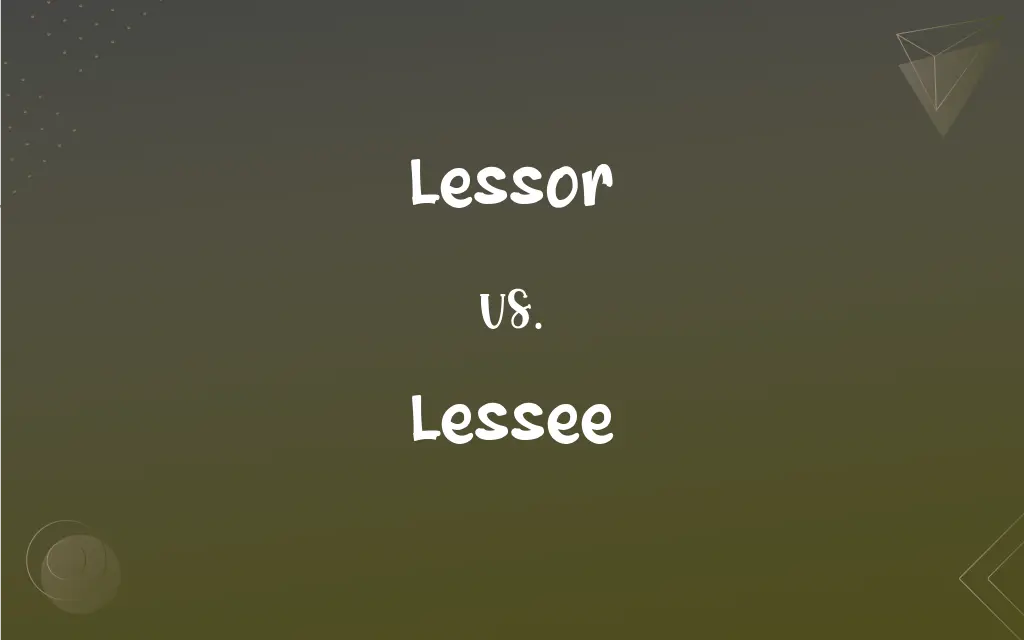Lessor vs. Lessee: What's the Difference?
Edited by Aimie Carlson || By Harlon Moss || Updated on October 12, 2023
A "lessor" is one who rents property to another, and a "lessee" is one who rents property from a lessor. Both pertain to a rental agreement.

Key Differences
In a leasing agreement, two primary parties are involved: the lessor and the lessee. The lessor is the entity that owns the asset and provides it for rent. Meanwhile, the lessee is the individual or entity that obtains the right to use the asset by paying rent. Both are bound by the terms stipulated in the lease agreement, ensuring that the interests and rights of both the lessor and lessee are protected.
Analyzing the perspective of the lessor, they retain ownership of the asset and generate income through the leasing arrangement. On the other side, the lessee, while not owning the asset, gains the right to utilize it for either personal or commercial purposes. Both the lessor and lessee bear respective responsibilities and rights during the lease period.
Focusing on legal obligations, the lessor must ensure that the asset is in a usable and safe condition for the lessee. Conversely, the lessee is typically responsible for maintaining the property in good condition and ensuring that it is used appropriately. Both lessor and lessee should adhere to legal and contractual obligations to avoid disputes and ensure a smooth leasing experience.
Regarding financial aspects, the lessor usually establishes the rental rate, while also potentially bearing certain ongoing costs associated with ownership. The lessee, in contrast, is responsible for making timely rental payments to the lessor and may also bear costs related to the use and maintenance of the rented property. Both financial roles are essential to maintain the feasibility of the leasing agreement.
In termination or conclusion scenarios, the lessor may decide whether to offer the lessee an opportunity to renew the lease or retake possession of the asset. The lessee, at the end of the lease term, might have options like returning the asset, purchasing it (if a purchase option exists), or renegotiating the lease terms. Both lessor and lessee must communicate and agree on the steps to be taken as the lease concludes.
ADVERTISEMENT
Comparison Chart
Definition
Owner of the asset and lease provider.
Renter and user of the leased asset.
Obligation
Provide a usable and safe asset for rent.
Ensure the proper use and maintenance of asset.
Financial Role
Determines rental rate and receives payments.
Makes timely rental payments.
Legal Position
Must adhere to leasing laws as an owner.
Must abide by laws pertaining to usage and rent.
End of Lease Role
Decide on lease renewal or asset retrieval.
Decide to return, buy, or renegotiate the lease.
ADVERTISEMENT
Lessor and Lessee Definitions
Lessor
A lessor is the legal owner of an asset leased to another party.
The lessor retains the title of the property even during the lease period.
Lessee
A lessee utilizes the leased asset for a predetermined period without owning it.
The lessee used the farmland to cultivate seasonal crops.
Lessor
A lessor earns income through the rental payments made by the lessee.
The lessor relied on the steady income from the rental properties.
Lessee
A lessee is an individual or entity that rents an asset from its owner.
The lessee paid his monthly rent on the first of every month.
Lessor
A lessor holds legal responsibilities related to the condition and ownership of the leased asset.
The lessor was required to ensure that the apartment met all safety codes.
Lessee
A lessee must use the leased asset in accordance with relevant laws and contractual stipulations.
The lessee ensured the machinery was operated adhering to safety regulations.
Lessor
A lessor engages in a contractual agreement, defining the terms of the lease with the lessee.
The lessor specified the permissible uses of the property in the lease agreement.
Lessee
A lessee enters a lease agreement, committing to adhere to specified terms and conditions.
The lessee agreed to a no-pets policy in the apartment lease.
Lessor
A lessor provides the asset for temporary use to the lessee.
The lessor provided the machinery to the manufacturing company for two years.
Lessee
A lessee is responsible for making regular payments to the lessor in exchange for the use of an asset.
The lessee ensured that payment was transferred before the due date.
Lessor
One who leases property; a landlord.
Lessee
One that holds a lease; a tenant.
Lessor
(property law) The owner of property that is leased; the landlord to a lease.
Lessee
An individual or a corporation who has the right of use of something of value, gained through a lease agreement with the real owner of the property.
Lessor
One who leases; the person who lets to farm, or gives a lease.
Lessee
The entity to whom a lease is given, or who takes an estate by lease.
Lessor
Someone who grants a lease
Lessee
Someone who is allowed to use a house, building, land etc. for a period of time in return for payment to the owner.
Lessee
Pronunciation spelling of let's see
Lessee
The person to whom a lease is given, or who takes an estate by lease.
Lessee
A tenant who holds a lease
FAQs
Who makes the lease payments?
The lessee is responsible for making the agreed-upon lease payments to the lessor.
Is the lessor responsible for maintenance?
Typically, the lessor is responsible for general maintenance unless otherwise stated in the lease.
What does a lessee do?
A lessee rents and uses an asset from a lessor in exchange for payment.
What is a lessor?
A lessor is the owner of an asset who rents it out to a lessee.
Can a lessor refuse to renew a lease?
Yes, a lessor can refuse to renew a lease upon its expiration.
What responsibilities does a lessee have at the end of a lease?
The lessee must return the asset and may be responsible for any wear and tear repairs, unless a purchase option is exercised.
Is a lessee’s liability limited to the lease period?
Yes, a lessee’s liability and rights are typically limited to the duration of the lease period.
What happens if a lessor fails to uphold lease obligations?
If a lessor fails to uphold obligations, the lessee may seek legal remedies, which may include termination of the lease.
Is a lessee considered the owner of the asset?
No, the lessee has usage rights but does not own the asset.
Can a lessor demand early lease termination?
A lessor generally cannot demand early termination unless the lessee violates terms or legal provisions allow it.
How is a lessee’s payment determined?
A lessee's payment is usually determined by the lessor based on asset value, lease duration, and market rates.
Can a lessor terminate a lease early?
A lessor may only terminate a lease early under conditions specified in the contract or legal provisions.
What is a lessor’s primary financial interest?
A lessor’s primary financial interest is earning income through lease payments.
Can a lessor change the lease terms midway?
No, a lessor cannot change the agreed-upon terms midway through the lease period unless allowed by the contract.
What rights does a lessor have over the leased asset?
The lessor retains ownership rights and can set conditions for usage and maintenance by the lessee.
What obligations does a lessee have towards the leased asset?
A lessee is typically obliged to use and maintain the asset properly and pay the agreed rental amounts.
Can a lessee negotiate lease terms?
Yes, lessees can often negotiate lease terms with the lessor before signing the agreement.
What happens if a lessee breaks the lease?
If a lessee breaks the lease, they may face penalties as stipulated in the agreement.
Can a lessor use the leased asset?
No, a lessor cannot use the asset during the lease term as the usage rights are transferred to the lessee.
Can a lessee sublet the asset?
A lessee can sublet only if the lease agreement allows subleasing.
About Author
Written by
Harlon MossHarlon is a seasoned quality moderator and accomplished content writer for Difference Wiki. An alumnus of the prestigious University of California, he earned his degree in Computer Science. Leveraging his academic background, Harlon brings a meticulous and informed perspective to his work, ensuring content accuracy and excellence.
Edited by
Aimie CarlsonAimie Carlson, holding a master's degree in English literature, is a fervent English language enthusiast. She lends her writing talents to Difference Wiki, a prominent website that specializes in comparisons, offering readers insightful analyses that both captivate and inform.































































